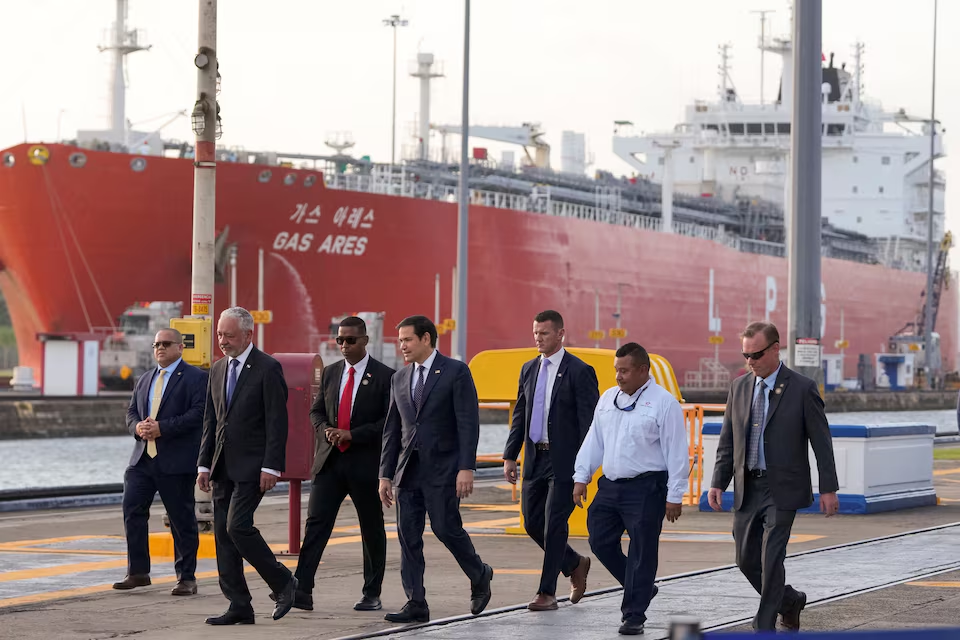In a tense diplomatic showdown, U.S. Secretary of State Marco Rubio issued a stark warning to Panama, demanding that the Central American nation sever its growing ties with China over the Panama Canal or face possible U.S. action. The warning comes amid concerns over China’s increasing influence through Hong Kong-based companies controlling key ports at both ends of the canal, a vital global waterway. Panama’s failure to respond to the United States’ request could have serious geopolitical consequences for both nations.
Rubio’s message to President José Raúl Mulino was clear and firm: the U.S. will not tolerate China’s expanding influence over the Panama Canal. During talks in Panama City, Rubio, delivering a message from President Donald Trump, expressed the United States’ dissatisfaction with Panama’s handling of Chinese business interests in the country. The Chinese-controlled ports near the canal’s entrances have raised concerns in Washington, as China could potentially use them as leverage during future conflicts. The U.S. sees this as a violation of its 1977 treaty with Panama, which established the canal as a neutral international waterway.
“We cannot stand by and allow China to operate vital ports at the Panama Canal,” Rubio said. “If Panama does not take immediate action to sever ties with Chinese-controlled businesses, we will have to take necessary measures to protect U.S. interests.” However, the specifics of what actions the U.S. might take remain unclear, leaving room for speculation about potential economic, political, or even military responses.
While Mulino remained firm on Panama’s sovereignty, signaling a willingness to review Chinese business agreements, he dismissed the notion of any compromise regarding the canal’s neutrality. “The sovereignty of Panama over the canal is non-negotiable,” he asserted. The president did, however, agree to review several key Chinese business deals, including the 25-year concession held by Hong Kong-based CK Hutchison Holdings for operating ports at both entrances of the canal. This deal, renewed in 2021, has become a focal point for critics of Panama’s growing ties with China, who argue that it undermines the U.S.-Panama neutrality treaty.
The tension surrounding the canal is not just a bilateral issue but part of a broader geopolitical struggle, as China seeks to expand its economic and political influence through initiatives like the Belt and Road Initiative. Despite the U.S. claims, China maintains that it plays no part in operating the canal, respecting Panama’s sovereignty and independence. Chinese officials have strongly denied any interference, calling the Panama Canal “a permanently neutral international waterway.”
As the debate over the canal intensifies, it becomes increasingly clear that U.S. officials, particularly under the leadership of President Trump, view this as an issue of national security. The canal, a key trade route connecting the Pacific and Atlantic oceans, is crucial for U.S. shipping and global commerce. Rubio, a longtime critic of China, has emphasized that any Chinese control over the canal could potentially disrupt U.S. interests, especially in the event of a conflict with Beijing.
The diplomatic showdown is only the latest chapter in a broader effort by the U.S. to curb China’s influence in Latin America, a region where Beijing has made significant inroads in recent years. Rubio’s visit to Panama is part of his wider tour of Central America and the Caribbean aimed at refocusing U.S. diplomacy in the region, particularly in light of growing migration pressures at the U.S. southern border.
While immigration was also a key topic in Rubio’s talks with Mulino, the Panama Canal dispute remains the centerpiece of their discussions. Panama has announced plans to review agreements with China, and Mulino hinted that the country may terminate its participation in China’s Belt and Road Initiative. However, the president has made it clear that Panama will not yield on the issue of its canal sovereignty, setting the stage for a protracted diplomatic standoff.
This standoff underscores the complex nature of international relations, where trade routes, national sovereignty, and geopolitical influence intersect. As the situation unfolds, the global community will be watching closely to see whether Panama chooses to distance itself from China’s influence or faces consequences from its most significant ally, the United States.
Stay ahead with the latest news on global innovation, leadership, entrepreneurship, business, and technology. Join us on WhatsApp or Telegram for real-time updates on this and other critical stories. Have a report or article you’d like to share? Send it to report@theinnovationtimes.com.
Follow us on X (Twitter), Instagram, LinkedIn, YouTube, Pinterest, and Facebook for more insights, trends, and expert commentary.



